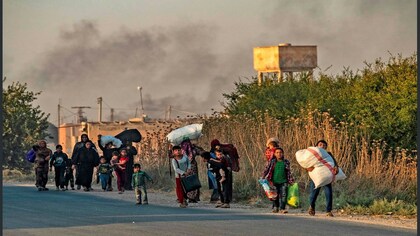Preventing a nuclear Iran
21:07 - 27 March 2012

To contain Iran, or to preempt? That is, at present, the question. President Obama’s recent dismissal of containment as an option would seem to stack the deck. Unless Iran pauses its uranium enrichment activities, an Israeli or U.S. strike against its nuclear facilities looks likely by next year.
Containment always looks better in theory, or in retrospect, than it works in practice. Our four-decade containment of the Soviet Union included several near misses, including the Berlin crisis and the Cuban missile crisis. And given the Iranian regime’s willingness to resort to terror tactics — even on U.S. soil — and President Mahmoud Ahmadinejad’s purported remarks about wiping Israel off the map, there are clear downsides to relying on Iranian rationality and trusting that the regime can be deterred.
On the other hand, preemption doesn’t look great, either. The Iranian regime, while dangerous, does not have suicidal tendencies. And the consequences of any airstrike against Iran’s enrichment facilities at Qom and Natanz would probably not be limited to direct counterattacks by Iranian agents and proxies against U.S. or Israeli forces in the region: International economic sanctions and arms bans against Iran are likely to be weakened and International Atomic Energy Agency (IAEA) monitors ejected from the Islamic republic. And for what? A one- to three-year delay, not destruction, of the Iranian bomb program — as well as greater consensus within Iran to pursue the nuclear option.
The good news is that there is a third approach: constriction. Essentially, we would continue to delay and minimize the scale of Iran’s nuclear program as we have been doing through sanctions and other means. We would keep doing this indefinitely, even if Iran gets a nuclear weapon.
Force would not be categorically ruled out under such a policy. But it would have to pass a cost-benefit test. Near-term strikes against the uranium-enrichment centrifuge installations fail that test. But in the future, factors might be different. Large reactors that are able to produce bomb-grade plutonium could be reasonable targets down the line. They are easy to see and virtually impossible to place underground.
Under a constriction policy, we would continue to do our utmost to prevent Iran from getting the bomb. But we would recognize that even if Iran had a handful of bombs, the balance of power in the Middle East in both nuclear and conventional terms would still tilt overwhelmingly toward Israel.
If Iran continues to inch toward the bomb, our policy should take a page from how the international community has handled North Korea the past two decades. The first Bush administration believed that Pyongyang probably had one or two bombs, yet neither President George H.W. Bush nor President Bill Clinton threatened war over that capability. In 1994, however, when North Korea threatened to reprocess plutonium for more bombs and build large reactors that could create the material for several dozen a year, Defense Secretary William Perry was emphatic that a North Korean nuclear arsenal could not be tolerated. His warning was heard loud and clear in Pyongyang, and the agreed framework resulted.
After the George W. Bush administration mishandled the North Korean nuclear problem in 2002 and 2003, Pyongyang reprocessed enough plutonium for six to eight weapons. Yet two decades into its own nuclear age, North Korea remains a minimal nuclear power with, at best, a small deterrent of last resort.
Of course, achieving this outcome with North Korea required a negotiated accord, and the agreement was flawed. But it capped the North’s nuclear ventures for many years. There is little near-term prospect of reaching an agreement with Iran. But we can pursue the same goal with other means. Non-military methods have already slowed Iran’s nuclear program by two to three years relative to expectations that were common in 2008-09 about how long it would take Tehran to produce its first bomb. That is every bit as much as we could hope to slow Iran with an airstrike campaign — without weakening the international consensus to keep simultaneously tightening sanctions and without giving Iran an easy excuse to expel inspectors.
By Michael O’Hanlon and Bruce Riedel
Source – The Washington Post
Containment always looks better in theory, or in retrospect, than it works in practice. Our four-decade containment of the Soviet Union included several near misses, including the Berlin crisis and the Cuban missile crisis. And given the Iranian regime’s willingness to resort to terror tactics — even on U.S. soil — and President Mahmoud Ahmadinejad’s purported remarks about wiping Israel off the map, there are clear downsides to relying on Iranian rationality and trusting that the regime can be deterred.
On the other hand, preemption doesn’t look great, either. The Iranian regime, while dangerous, does not have suicidal tendencies. And the consequences of any airstrike against Iran’s enrichment facilities at Qom and Natanz would probably not be limited to direct counterattacks by Iranian agents and proxies against U.S. or Israeli forces in the region: International economic sanctions and arms bans against Iran are likely to be weakened and International Atomic Energy Agency (IAEA) monitors ejected from the Islamic republic. And for what? A one- to three-year delay, not destruction, of the Iranian bomb program — as well as greater consensus within Iran to pursue the nuclear option.
The good news is that there is a third approach: constriction. Essentially, we would continue to delay and minimize the scale of Iran’s nuclear program as we have been doing through sanctions and other means. We would keep doing this indefinitely, even if Iran gets a nuclear weapon.
Force would not be categorically ruled out under such a policy. But it would have to pass a cost-benefit test. Near-term strikes against the uranium-enrichment centrifuge installations fail that test. But in the future, factors might be different. Large reactors that are able to produce bomb-grade plutonium could be reasonable targets down the line. They are easy to see and virtually impossible to place underground.
Under a constriction policy, we would continue to do our utmost to prevent Iran from getting the bomb. But we would recognize that even if Iran had a handful of bombs, the balance of power in the Middle East in both nuclear and conventional terms would still tilt overwhelmingly toward Israel.
If Iran continues to inch toward the bomb, our policy should take a page from how the international community has handled North Korea the past two decades. The first Bush administration believed that Pyongyang probably had one or two bombs, yet neither President George H.W. Bush nor President Bill Clinton threatened war over that capability. In 1994, however, when North Korea threatened to reprocess plutonium for more bombs and build large reactors that could create the material for several dozen a year, Defense Secretary William Perry was emphatic that a North Korean nuclear arsenal could not be tolerated. His warning was heard loud and clear in Pyongyang, and the agreed framework resulted.
After the George W. Bush administration mishandled the North Korean nuclear problem in 2002 and 2003, Pyongyang reprocessed enough plutonium for six to eight weapons. Yet two decades into its own nuclear age, North Korea remains a minimal nuclear power with, at best, a small deterrent of last resort.
Of course, achieving this outcome with North Korea required a negotiated accord, and the agreement was flawed. But it capped the North’s nuclear ventures for many years. There is little near-term prospect of reaching an agreement with Iran. But we can pursue the same goal with other means. Non-military methods have already slowed Iran’s nuclear program by two to three years relative to expectations that were common in 2008-09 about how long it would take Tehran to produce its first bomb. That is every bit as much as we could hope to slow Iran with an airstrike campaign — without weakening the international consensus to keep simultaneously tightening sanctions and without giving Iran an easy excuse to expel inspectors.
By Michael O’Hanlon and Bruce Riedel
Source – The Washington Post



